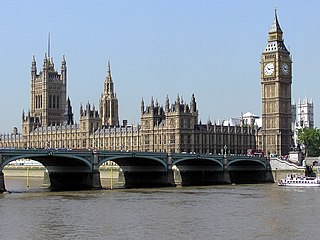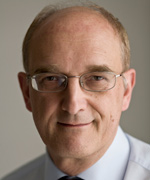The Office of Science and Technology (OST), later (briefly) named the Office of Science and Innovation, was a non-ministerial government department of the British government between 1992 and 2007.
The office was responsible for co-ordination of the government's science and technology related activities and policies, and the distribution of some £2.4 billion among the seven UK Research Councils. It was headed by the Chief Scientific Adviser; initially this was Sir William Stewart, then Sir Robert May (later Lord May of Oxford), and finally Sir David King.
The OST was originally formed in 1992 as a merger of the Office of the Chief Scientific Adviser with the Science Branch of the Department of Education and Science (as it then was). Although originally run under the Cabinet Office, it was moved between departments in 1995 to operate under the Department of Trade and Industry. In early 2006, the office was renamed to the Office of Science and Innovation and was subsequently absorbed into the Department for Innovation, Universities and Skills in the Summer of 2007 when the Department for Education and Skills was split in two.
The Government Chief Scientific Advisor now heads the Government Office for Science.

The Department for Education and Skills (DfES) was a United Kingdom government department between 2001 and 2007, responsible for the education system as well as children's services in England.
The Higher Education Funding Council for England (HEFCE) was a non-departmental public body in the United Kingdom, which was responsible for the distribution of funding for higher education to universities and further education colleges in England since 1992. It ceased to exist as of 1 April 2018, when its duties were divided between the newly created Office for Students and Research England.

Sir David Anthony King is a South African-born British chemist, academic, and head of the Climate Crisis Advisory Group.
Forfás was the national policy advisory board for enterprise, trade, science, technology and innovation in Ireland. The agency was established in January 1994 under the Industrial Development Act, 1993 and was run by a board appointed by the Minister for Enterprise, Trade and Employment, to whom the agency was responsible. Forfás was dissolved on 1 August 2014 and its functions were transferred to the Department of Enterprise, Trade and Employment, Enterprise Ireland, the Industrial Development Authority and the Health and Safety Authority.
The Engineering and Physical Sciences Research Council (EPSRC) is a British Research Council that provides government funding for grants to undertake research and postgraduate degrees in engineering and the physical sciences, mainly to universities in the United Kingdom. EPSRC research areas include mathematics, physics, chemistry, artificial intelligence and computer science, but exclude particle physics, nuclear physics, space science and astronomy. Since 2018 it has been part of UK Research and Innovation, which is funded through the Department for Business, Energy and Industrial Strategy.

The Defence Science and Technology Laboratory (Dstl) is an executive agency of the Ministry of Defence of the United Kingdom. Its stated purpose is "to maximise the impact of science and technology for the defence and security of the UK". The agency is headed by Paul Hollinshead as its chief executive, with the board being chaired by Adrian Belton. Ministerial responsibility lies with the Minister for Defence Procurement.

The Parliamentary Office of Science and Technology (POST) is the Parliament of the United Kingdom's in-house source of independent, balanced and accessible analysis of public policy issues related to science and technology. POST serves both Houses of Parliament.
The UK Government Chief Scientific Adviser (GCSA) is the personal adviser on science and technology-related activities and policies to the Prime Minister and the Cabinet. They are also the head of the Government Office for Science.

Sir David Charles Clary, FRS is a British theoretical chemist. He was president of Magdalen College, Oxford, from 2005 to 2020. He was the first chief scientific adviser to the Foreign and Commonwealth Office from 2009 to 2013. He is a Professor of Chemistry at the University of Oxford.
Sir Gareth Gwyn Roberts was a Welsh physicist specialising in semiconductors and molecular electronics, who was influential in British science policy through his chairmanship of several academic bodies and his two reports on the future supply of scientists and how university research should be assessed. He was knighted in 1997 for his services to higher education.

Research Councils UK, sometimes known as RCUK, was a non-departmental public body that coordinated science policy in the United Kingdom from 2002 to 2018. It was an umbrella organisation that coordinated the seven separate research councils that were responsible for funding and coordinating academic research for the arts, humanities, science and engineering. In 2018 Research Councils transitioned into UK Research and Innovation (UKRI).
The Science and Technology Facilities Council (STFC) is a United Kingdom government agency that carries out research in science and engineering, and funds UK research in areas including particle physics, nuclear physics, space science and astronomy.

The Department for Innovation, Universities and Skills (DIUS) was a UK government department created on 28 June 2007 to take over some of the functions of the Department of Education and Skills and of the Department of Trade and Industry. Its head office was based at Kingsgate House, 66-74 Victoria Street, London SW1, which has now been demolished. In June 2009 it was merged into the newly formed Department for Business, Innovation and Skills. It was responsible for adult learning, some parts of further education, higher education, skills, science and innovation.

Sir Leszek Krzysztof Borysiewicz is a British professor, immunologist and scientific administrator. He served as the 345th Vice-Chancellor of the University of Cambridge, his term of office started on 1 October 2010 and ended on 1 October 2017. Borysiewicz also served as chief executive of the Medical Research Council of the UK from 2007-2010 and was the chairman of Cancer Research UK from 2016 to 2023.

The Government Office for Science is a science advisory office in the UK Government. The office advises the Government on policy and decision-making based on science and long-term thinking. It has been led by Professor Dame Angela McLean, the Government Chief Scientific Adviser, since 23 February 2023.

The Department for Education (DfE) is a department of His Majesty's Government responsible for child protection, child services, education, apprenticeships, and wider skills in England.

Sir Mark Jeremy Walport is an English medical scientist and was the Government Chief Scientific Adviser in the United Kingdom from 2013 to 2017 and Chief Executive of UK Research and Innovation (UKRI) from 2017 to 2020. In 2023 he became the Foreign Secretary of The Royal Society.
The Scientific Advisory Group for Emergencies (SAGE) is a British Government body that advises central government in emergencies. It is usually chaired by the United Kingdom's Chief Scientific Adviser. Specialists from academia and industry, along with experts from within government, make up the participation, which will vary depending on the emergency. SAGE gained public prominence for its role in the 2020 COVID-19 pandemic in the United Kingdom.

Jennifer Rubin is a British social scientist and policy analyst who is professor of public policy at King's College London. A graduate and doctorate in social and political sciences, her research covers a wide area including research policy, government policy, public health and social care. She is elected Fellow of the Academy of Social Sciences. She is currently the Chief Scientific Officer at the UK Home office.

The Department for Science, Innovation and Technology (DSIT) is a department of the government of the United Kingdom. Established by Rishi Sunak in February 2023, DSIT took on policy responsibilities from the former Department for Business, Energy and Industrial Strategy (BEIS) and the Department for Digital, Culture, Media and Sport. The new department is responsible for helping to encourage, develop and manage the UK's scientific, research, and technological outputs. DSIT is also responsible for managing the necessary physical and digital infrastructure and regulation to support the British economy, UK public services, national security, and wider UK Government priorities.